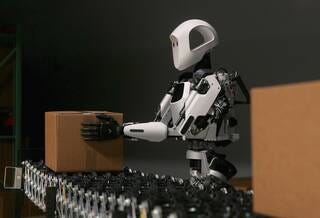Humanoid Robot Being Adapted for Space Exploration
NASA is working with Apptronik to adapt the company’s Apollo robot to assist with space missions

NASA has expanded its partnership with Apptronik, a Texas-based company building humanoid robots, to develop its Apollo robot for space exploration.
The partners are set to adapt Apptronik’s general-purpose humanoid robot, Apollo, to become an assistant to astronauts living either on space stations in orbit or even those located on Mars or the moon.
“General purpose robots of many forms, including humanoids, could be used on the lunar and Martian surface to offload mundane and dangerous tasks from astronauts, enabling humans to focus on science and exploration,” NASA said in a statement. “Robots could also assist with the maintenance of resource utilization plants that would allow astronauts to live off resources found on the surface.”
One day, these humanoid robots may even be used as remote avatars for human operators on Earth.
Apollo was designed for industrial applications, helping ease ongoing labor shortages and pressures in sectors such as logistics, manufacturing, hospitality and even health care.

Credit: NASA
Under the expanded collaboration, NASA will adapt the robot’s modularity to meet space-specific functions and expand its dexterity and autonomy for safe operation alongside astronauts.
“By applying NASA’s expertise in human-safe mobile robots to commercial projects, together we are able to spur innovation in this important field,” said Shaun Azimi, lead of the dexterous robotics team at NASA’s Johnson Space Center in Houston. “We are proud to see our efforts result in robotics technology that will benefit the American economy and assist humans in working safely and productively here on Earth and potentially in space exploration as well.”
The partners first collaborated in 2013 to develop NASA’s Valkyrie robot as part of the DARPA Robotics Challenge. This humanoid model was sent for tests on an oil rig in Australia in July. Last September, Apptronik announced it made NASA a commercial partner to help launch Apollo’s commercialization.
About the Author
You May Also Like








